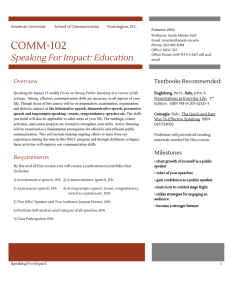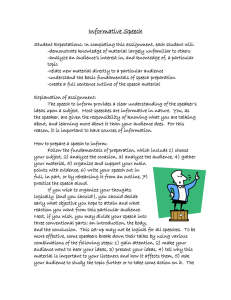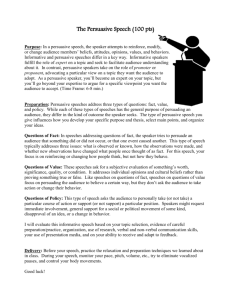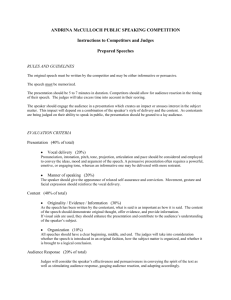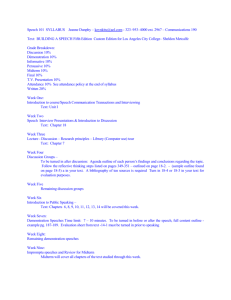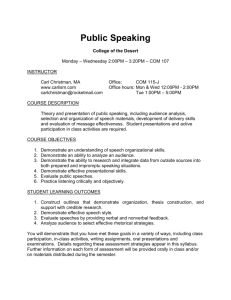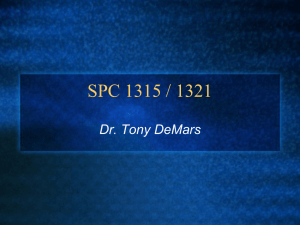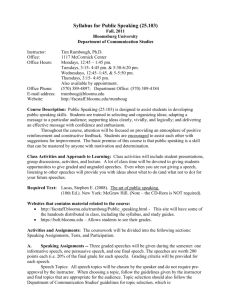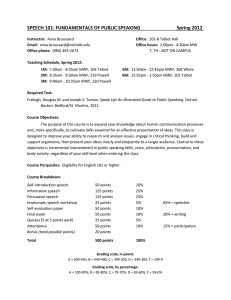Touro College Course Outline (Updated Weekly)
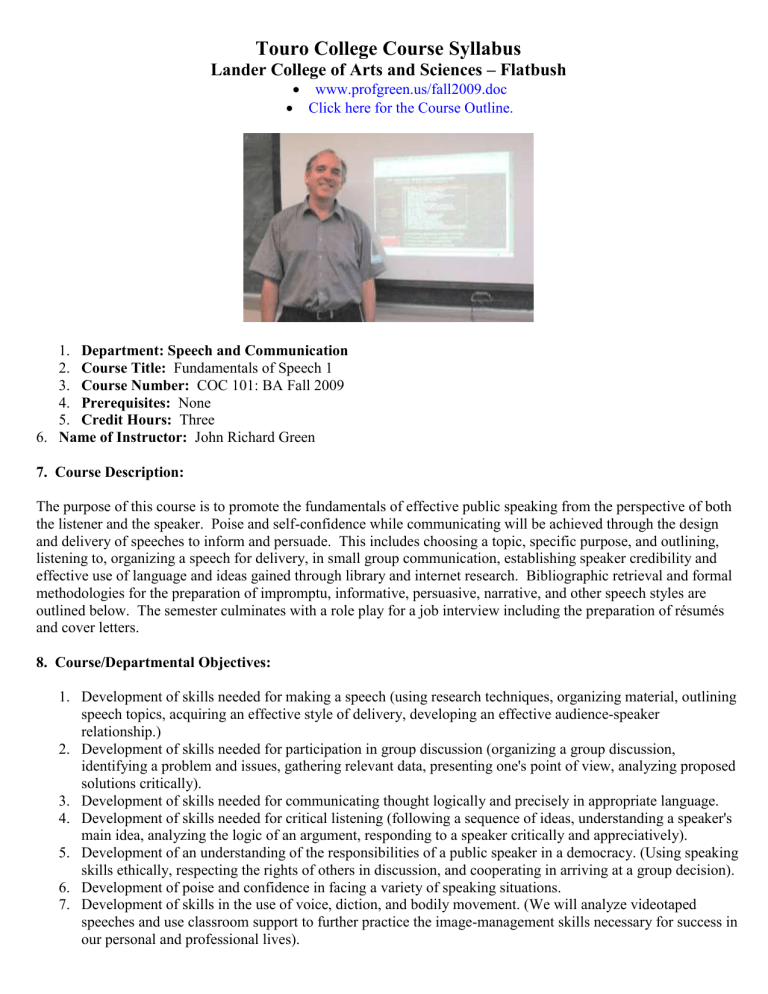
Touro College Course Syllabus
Lander College of Arts and Sciences – Flatbush
www.profgreen.us/fall2009.doc
Click here for the Course Outline.
1.
Department: Speech and Communication
2.
Course Title: Fundamentals of Speech 1
3.
Course Number: COC 101: BA Fall 2009
4.
Prerequisites: None
5.
Credit Hours: Three
6. Name of Instructor: John Richard Green
7. Course Description:
The purpose of this course is to promote the fundamentals of effective public speaking from the perspective of both the listener and the speaker. Poise and self-confidence while communicating will be achieved through the design and delivery of speeches to inform and persuade. This includes choosing a topic, specific purpose, and outlining, listening to, organizing a speech for delivery, in small group communication, establishing speaker credibility and effective use of language and ideas gained through library and internet research. Bibliographic retrieval and formal methodologies for the preparation of impromptu, informative, persuasive, narrative, and other speech styles are outlined below. The semester culminates with a role play for a job interview including the preparation of résumés and cover letters.
8. Course/Departmental Objectives:
1.
Development of skills needed for making a speech (using research techniques, organizing material, outlining speech topics, acquiring an effective style of delivery, developing an effective audience-speaker relationship.)
2.
Development of skills needed for participation in group discussion (organizing a group discussion, identifying a problem and issues, gathering relevant data, presenting one's point of view, analyzing proposed solutions critically).
3.
Development of skills needed for communicating thought logically and precisely in appropriate language.
4.
Development of skills needed for critical listening (following a sequence of ideas, understanding a speaker's main idea, analyzing the logic of an argument, responding to a speaker critically and appreciatively).
5.
Development of an understanding of the responsibilities of a public speaker in a democracy. (Using speaking skills ethically, respecting the rights of others in discussion, and cooperating in arriving at a group decision).
6.
Development of poise and confidence in facing a variety of speaking situations.
7.
Development of skills in the use of voice, diction, and bodily movement. (We will analyze videotaped speeches and use classroom support to further practice the image-management skills necessary for success in our personal and professional lives).
9. Course Content:
A.
An Overview of the Communication Process: a.
The Value of Speech in the Marketplace b.
The Importance of Speech in Interpersonal Communication c.
The Requirements of Speech in Intercultural Settings
B.
Public Speaking: a.
The Organization of the Speech Outline:
1. Attention-Getting Opening
2. Thesis Statement
3. Preview
4. Transitions
5. Organizational Strategies for the Body
6. Review
7. Generalization of the Lesson Learned
8. Application/-s of the Lesson Learned
C. Practice Speeches:
1. Introduce a Classmate (warm-up)
2. Self-Introduction (warm-up)
3. Impromptu Presentation (warm-up)
4. Narrative Speech #1 (5 %)
5. Informative Speech (10%)
6. Demonstration Speech (10%)
7. Persuasive Presentation #1 (10%)
8. Persuasive Presentation #2 (10%)
9. Narrative Speech #2 (10%)
10. Extemporaneous/Expository Speech (10%)
D. Research and Bibliographic Retrieval (Library and Internet Resources)
E. Conversational Techniques and Strategies For Active Listening Include:
1. Practice in phrasing questions:
1. for information
2. for clarification
3. for verification
4. for an opinion
5. for correction
2. The Five Elements of a Conversational Quality:
1. Enthusiasm
2. Vocal Variety
3. Directness (Eye Contact)
4. Fluency
5. Spontaneity
F. Interviewing Techniques and Strategies:
1. Situational role play in interpersonal settings: job interviewing,
2. and, in mock and spar debates.
10.
Course Requirements:
A.
Attendance: Students must come to class punctually and attend class regularly.
Departmental policy stipulates that:
1.
Being late three times is equivalent to one absence.
2.
Four or more absences will result in a poor or failing final grade.
3.
A student with six or more absences by the midterm should be encouraged to withdraw from the course.
B.
Speaking:
Students’ experience in oral presentations, class discussions, small group discussions and public speaking formats include skill in the ability to frame and respond to questions and critique each others' video-recorded speeches.
C.
Writing: Writing is an important adjunct of this course. The construction of informative and persuasive speech outlines are the principal writing activities. Written homework assignments (critiques) are assigned after each session to prepare improvements for the next oral assignment. Students will practice their writing skills to support the preparation of their speaking skills. A variety of expository writing assignments include note taking, observations, analysis, outlining, speaking preparation, among others. Oral review of these assignments will encourage and develop expressive language.
D.
Library/Internet: The instructor will arrange a library and Internet orientation with the librarian by the fifth week of class in preparation for the informative, persuasive and other speeches that end the semester.
Students must be encouraged to use the library and Internet for their research on a regular basis.
E.
Tests: Students will take midterm and final examinations, plus short quizzes as the instructor deems appropriate. An impromptu speech or spar debate should be part of both exams. The final exam score includes a written component based on all of the textbook chapters. Vocabulary is an important part of all testing. Each student must demonstrate oral English facility in a variety of ways as part of each test.
11. Grading Guidelines:
Students’ Final Grade will be based on the results of their Attendance, Preparation for Class, Class Participation,
Written Work, Oral Presentations, and Examinations as follows:
65% Speeches and Oral Presentations (5 points off for lateness.)
10% Quality of Class Participation in Job Interviews, Debates, Etc. (This is affected by absences and illnesses.)
10% 2 Written Critiques (5 points off for lateness.)
15% Midterm and Final Examinations
12. Course Textbook:
Title: The Challenge of Effective Speaking, 13 th
Edition
Author: Rudolf F. Verderber / Kathleen S. Verderber.
Date of Publication: 2006
Publisher: Thomson Wadsworth, Inc., 13 th
Edition
ISBN # : 0-534-64697-2
A.
Enter the above ISBN # at http://half.com
and order your book so that you have it the 2 nd
week of class.
B.
Sign and return a copy of the syllabus after you have read both the syllabus and the course outline to confirm that:
“I have read and understand the assignments and policies for the semester:”
_______________________________________ _____________________
Student’s name Date

